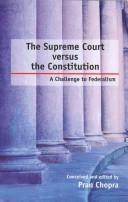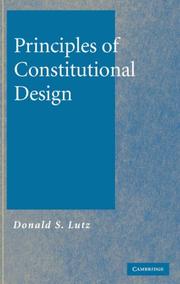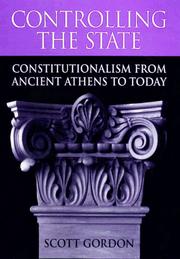| Listing 1 - 10 of 21 | << page >> |
Sort by
|
Book
ISBN: 0191747661 0191651613 0191651605 9780191651601 9780191747663 9780191651618 9780199602117 0199602115 Year: 2013 Publisher: Oxford : Oxford University Press,
Abstract | Keywords | Export | Availability | Bookmark
 Loading...
Loading...Choose an application
- Reference Manager
- EndNote
- RefWorks (Direct export to RefWorks)
The idea of the separation of powers is still popular in much political and constitutional discourse, though its meaning for the modern state remains unclear and contested. This book develops a new, comprehensive, and systematic account of the principle. It then applies this new concept to legal problems of different national constitutional orders, the law of the European Union, and international institutional law. It connects an argument from normative political theory withphenomena taken from comparative constitutional law. The book argues that the conflict between individual liberty and dem
Separation of powers. --- Checks and balances (Separation of powers) --- Division of powers --- Powers, Separation of --- Separation of powers --- Constitutional law --- Political science --- Delegation of powers --- Executive power --- Judicial independence --- Judicial power --- Judicial review --- Legislative power --- Law and legislation
Book
ISBN: 0199987459 9780199987450 9780199987443 0199987440 Year: 2013 Publisher: Oxford : Oxford Univesity Press,
Abstract | Keywords | Export | Availability | Bookmark
 Loading...
Loading...Choose an application
- Reference Manager
- EndNote
- RefWorks (Direct export to RefWorks)
This title presents a bold argument that constitutional states are not weaker because their powers are divided - they are often stronger because they solve collective action problems rooted in speech and communication.
Separation of powers. --- Political sociology. --- Democracy --- Social aspects. --- Psychological aspects. --- Self-government --- Political science --- Equality --- Representative government and representation --- Republics --- Mass political behavior --- Political behavior --- Sociology --- Checks and balances (Separation of powers) --- Division of powers --- Powers, Separation of --- Separation of powers --- Constitutional law --- Delegation of powers --- Executive power --- Judicial independence --- Judicial power --- Judicial review --- Legislative power --- Sociological aspects --- Law and legislation

ISBN: 9780865971752 0865971749 9780865971745 0865971757 9781614878735 1614878730 Year: 1998 Publisher: Indianapolis (Ind.) Liberty Fund
Abstract | Keywords | Export | Availability | Bookmark
 Loading...
Loading...Choose an application
- Reference Manager
- EndNote
- RefWorks (Direct export to RefWorks)
Vile traces the history of the doctrine from its rise during the English Civil War, through its development in the eighteenth century -- through subsequent political thought and constitution-making in Britain, France, and the United States.
Separation of powers. --- Checks and balances (Separation of powers) --- Division of powers --- Powers, Separation of --- Separation of powers --- Constitutional law --- Political science --- Delegation of powers --- Executive power --- Judicial independence --- Judicial power --- Judicial review --- Legislative power --- Law and legislation --- Constitutional law. --- Constitutional limitations --- Constitutionalism --- Constitutions --- Limitations, Constitutional --- Public law --- Administrative law --- Interpretation and construction

ISBN: 0801892236 1435692187 9781435692183 9780801892233 0801877822 9780801877827 9780801885389 0801885388 Year: 2004 Publisher: Baltimore Johns Hopkins University Press
Abstract | Keywords | Export | Availability | Bookmark
 Loading...
Loading...Choose an application
- Reference Manager
- EndNote
- RefWorks (Direct export to RefWorks)
At a moment when American politicians and citizenry are struggling to balance competing needs, such as civil rights and homeland security, The Communitarian Constitution is vital reading for anyone interested in the evolving tensions between individual rights and the good of the community.
Constitutional law --- Common good. --- Public interest. --- Separation of powers. --- Good, Common --- Public good --- Political science --- Consensus (Social sciences) --- Justice --- Public interest --- State, The --- Common good --- Checks and balances (Separation of powers) --- Division of powers --- Powers, Separation of --- Separation of powers --- Delegation of powers --- Executive power --- Judicial independence --- Judicial power --- Judicial review --- Legislative power --- Philosophy. --- Law and legislation

ISBN: 9352800206 128215401X 9786612154010 813210272X 9788132102724 0761934448 0761934456 9780761934448 0761934448 Year: 2006 Publisher: New Delhi Thousand Oaks, Calif. Sage Publications
Abstract | Keywords | Export | Availability | Bookmark
 Loading...
Loading...Choose an application
- Reference Manager
- EndNote
- RefWorks (Direct export to RefWorks)
The right to amend the Constitution in India lies with Parliament, when `meeting in the exercise of its constituent power`. In the last quarter of a century, however, and in an atmosphere of judicial activism in the face of a faltering Parliament and administration, the Supreme Court has gone beyond its role as interpreter of the Constitution to become its arbiter. Pran Chopra defines the problem and presents an overarching analysis. He argues that a great deal is at stake in this situation, including the dynamics of federalism, which makes India possible; the role of the Constitution in holdi
Separation of powers --- Constitutional amendments --- Political questions and judicial power --- Checks and balances (Separation of powers) --- Division of powers --- Powers, Separation of --- Constitutional law --- Political science --- Delegation of powers --- Executive power --- Judicial independence --- Judicial power --- Judicial review --- Legislative power --- Law and legislation --- India. --- India (Republic). --- Supreme Court of India
Book
ISBN: 9460949681 9789460949685 9462361169 9789462361164 1322319057 Year: 2014 Publisher: The Hague
Abstract | Keywords | Export | Availability | Bookmark
 Loading...
Loading...Choose an application
- Reference Manager
- EndNote
- RefWorks (Direct export to RefWorks)
An independent judiciary is crucial for upholding the rule of law and for the protection of human rights in a democratic society. The Independence of Judges is an anthology, illustrating that there is still a need for further exploration and reflection on various aspects of the principle of judicial independence. The book presents 22 articles, written from different perspectives and analyses by judges, lawyers, public prosecutors, and scientists in the areas of law, social sciences, and media science. The book's contributions provide an overview of historical developments, as well as issues of
Judicial independence. --- Separation of powers --- Checks and balances (Separation of powers) --- Division of powers --- Powers, Separation of --- Constitutional law --- Political science --- Delegation of powers --- Executive power --- Judicial independence --- Judicial power --- Judicial review --- Legislative power --- Independence of the judiciary --- Independent judiciary --- History. --- Law and legislation
Book
ISBN: 1107215501 0511853009 1282916335 9786612916335 0511931824 0511930488 0511927975 0511933177 0511933827 0511925441 9780511933172 9780521493376 0521493374 9780511925443 9780511933820 Year: 2010 Publisher: Cambridge ; New York : Cambridge University Press,
Abstract | Keywords | Export | Availability | Bookmark
 Loading...
Loading...Choose an application
- Reference Manager
- EndNote
- RefWorks (Direct export to RefWorks)
In this 2010 book, Roger Masterman examines the dividing lines between the powers of the judicial branch of government and those of the executive and legislative branches in the light of two of the most significant constitutional reforms of recent years: the Human Rights Act (1998) and Constitutional Reform Act (2005). Both statutes have implications for the separation of powers within the United Kingdom constitution. The Human Rights Act brings the judges into much closer proximity with the decisions of political actors than previously permitted by the Wednesbury standard of review and the doctrine of parliamentary sovereignty, while the Constitutional Reform Act marks the emergence of an institutionally independent judicial branch. Taken together, the two legislative schemes form the backbone of a more comprehensive system of constitutional checks and balances policed by a judicial branch underpinned by the legitimacy of institutional independence.
Judicial power --- Separation of powers --- Checks and balances (Separation of powers) --- Division of powers --- Powers, Separation of --- Constitutional law --- Political science --- Delegation of powers --- Executive power --- Judicial independence --- Judicial review --- Legislative power --- Judiciary --- Justiciability --- Power, Judicial --- Courts --- Implied powers (Constitutional law) --- Law and legislation --- Law --- General and Others --- Judicial power - Great Britain --- Separation of powers - Great Britain --- Royaume-Uni

ISBN: 0521861683 9780521861687 9780511510267 9780521063760 9780511250606 0511250606 0511510268 9780511249587 0511249586 0511250096 9780511250095 0521063760 1107168287 128070358X 0511249039 0511319231 Year: 2006 Publisher: Cambridge ; New York : Cambridge University Press,
Abstract | Keywords | Export | Availability | Bookmark
 Loading...
Loading...Choose an application
- Reference Manager
- EndNote
- RefWorks (Direct export to RefWorks)
This book is written for anyone, anywhere sitting down to write a constitution. The book is designed to be educative for even those not engaged directly in constitutional design but who would like to come to a better understanding of the nature and problems of constitutionalism and its fundamental building blocks - especially popular sovereignty and the separation of powers. Rather than a 'how-to-do-it' book that explains what to do in the sense of where one should end up, it instead explains where to begin - how to go about thinking about constitutions and constitutional design before sitting down to write anything. Still, it is possible, using the detailed indexes found in the book, to determine the level of popular sovereignty one has designed into a proposed constitution and how to balance it with an approximate, appropriate level of separation of powers to enhance long-term stability.
Comparative government --- Constitutions --- Separation of powers --- Sovereignty --- Checks and balances (Separation of powers) --- Division of powers --- Powers, Separation of --- Constitutional law --- Political science --- Delegation of powers --- Executive power --- Judicial independence --- Judicial power --- Judicial review --- Legislative power --- Associations, institutions, etc. --- Law --- Comparative political systems --- Comparative politics --- Government, Comparative --- Political systems, Comparative --- State sovereignty (International relations) --- International law --- Common heritage of mankind (International law) --- International relations --- Self-determination, National --- Law and legislation --- Constitutions. --- Comparative government. --- Separation of powers. --- Sovereignty. --- Social Sciences --- Political Science

ISBN: 0674037839 9780674037830 0674169875 9780674169876 0674009770 9780674009776 Year: 2002 Publisher: Cambridge (Mass.) Harvard University Press
Abstract | Keywords | Export | Availability | Bookmark
 Loading...
Loading...Choose an application
- Reference Manager
- EndNote
- RefWorks (Direct export to RefWorks)
This work examines the theory and practice of constitutionalism. It explores the main venues of constitutional practice in ancient Athens, Republican Rome, Renaissance Venice, the Dutch Republic, 17th-century England and 18th century America.
Separation of powers. --- Authority. --- Liberty. --- Constitutional history. --- Constitutional history, Modern --- Constitutional law --- Constitutions --- History --- Civil liberty --- Emancipation --- Freedom --- Liberation --- Personal liberty --- Democracy --- Natural law --- Political science --- Equality --- Libertarianism --- Social control --- Authoritarianism --- Consensus (Social sciences) --- Checks and balances (Separation of powers) --- Division of powers --- Powers, Separation of --- Separation of powers --- Delegation of powers --- Executive power --- Judicial independence --- Judicial power --- Judicial review --- Legislative power --- Law and legislation
Book
ISBN: 1139334174 110722747X 1280393920 9786613571847 1139337556 113934000X 1139341588 1139336681 1139338420 0511902557 9781139338424 9780511902550 9781139336680 9781139340007 9781107006379 1107006376 9781139340007 9781107471054 1107471052 9781139334174 9781280393921 6613571849 9781139337557 9781139341585 Year: 2012 Publisher: Cambridge, UK ; New York : Cambridge University Press,
Abstract | Keywords | Export | Availability | Bookmark
 Loading...
Loading...Choose an application
- Reference Manager
- EndNote
- RefWorks (Direct export to RefWorks)
At a time when the operation and reform of federal relations within Australia is squarely on the political agenda, this volume brings together eminent lawyers, economists and political scientists who explain, analyse and evaluate the theory and principles underpinning the Australian federal system. Topics covered include the High Court's approach to the interpretation of the Constitution and how this has influenced federal relations in practice; different forms of inter-governmental co-operative arrangements; fiscal relations between the Commonwealth and the States; and emergent ethno-cultural and socioeconomic diversity within the Australian Federation. Comparative perspectives from Germany, America, Canada, Switzerland, India and the European Union provide unique prisms through which to view the operation of the Australian system and to contemplate its reform.
Federal government --- Separation of powers --- Checks and balances (Separation of powers) --- Division of powers --- Powers, Separation of --- Constitutional law --- Political science --- Delegation of powers --- Executive power --- Judicial independence --- Judicial power --- Judicial review --- Legislative power --- Federal-provincial relations --- Federal-state relations --- Federal systems --- Federalism --- Powers, Division of --- Provincial-federal relations --- State-federal relations --- Central-local government relations --- Decentralization in government --- Law and legislation --- Political systems --- Australia --- Law --- General and Others
| Listing 1 - 10 of 21 | << page >> |
Sort by
|

 Search
Search Feedback
Feedback About UniCat
About UniCat  Help
Help News
News